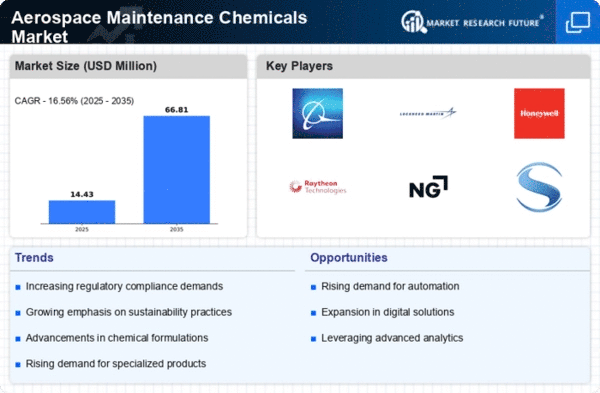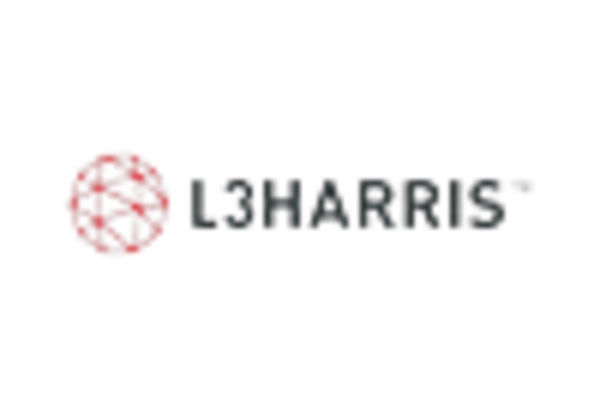-
Executive Summary
-
Scope of the Report
-
Market Definition
-
Scope of the Study
- Research Objectives
- Assumptions & Limitations
-
Markets Structure
-
Market Research
-
Methodology
-
Research Application
-
Secondary Research
-
Primary
-
Research
-
Forecast Model
-
Market Landscape
-
Five Forces Analysis
- Threat of New Entrants
- Bargaining Power of Buyers
- Threat of Substitutes
- Segment Rivalry
-
Bargaining Power of Buyers
-
Value Chain/Supply Chain of Global Aerospace Maintenance Chemicals Market
-
Industry Overview of Global Aerospace Maintenance Chemicals Market
-
Introduction
-
Growth Drivers
-
Impact Analysis
-
Market Challenges
-
Market Trends
-
Introduction
-
Growth Trends
-
Impact
-
Analysis
-
Global Aerospace Maintenance Chemicals Market, by Nature
-
Introduction
-
Organic
- Market Estimates & Forecast, 2022-
- Market Estimates & Forecast, by Region, 2022- 2030
- Market Estimates & Forecast, 2022- 2030
- Market
-
Inorganic
-
Estimates & Forecast, by Region, 2022- 2030
-
Global Aerospace Maintenance
-
Chemicals Market, by Product
-
Introduction
-
Aircraft Cleaning Chemicals
- Market Estimates & Forecast, 2022- 2030
- Market Estimates
-
& Forecast, by Region, 2022- 2030
-
Aircraft Leather Cleaners
- Market Estimates & Forecast,
-
Market Estimates & Forecast, 2022- 2030
-
by Region, 2022- 2030
-
Aviation Paint Removers
- Market Estimates
- Market Estimates & Forecast, by Region,
-
& Forecast, 2022- 2030
-
Aviation Paint Strippers
- Market Estimates & Forecast,
- Market Estimates & Forecast, by Region, 2022- 2030
-
Specialty Solvents
- Market Estimates & Forecast, 2022- 2030
- Market Estimates & Forecast, by Region, 2022- 2030
-
Degreasers
- Market Estimates & Forecast, 2022- 2030
- Market Estimates
-
& Forecast, by Region, 2022- 2030
-
Aircraft Wash & Polishes
- Market Estimates & Forecast,
-
Market Estimates & Forecast, 2022- 2030
-
by Region, 2022- 2030
-
Aluminum Brighteners
- Market Estimates
- Market Estimates & Forecast, by Region,
-
& Forecast, 2022- 2030
-
Others
- Market Estimates & Forecast, 2022- 2030
- Market Estimates & Forecast, by Region, 2022- 2030
-
Global Aerospace
-
Maintenance Chemicals Market, by Application
-
Introduction
-
Aircraft
- Market Estimates & Forecast, 2022- 2030
- Market Estimates
-
Parts
-
& Forecast, by Region, 2022- 2030
-
MRO (Maintenance, Repair, and Overhaul)
- Market Estimates & Forecast, 2022- 2030
- Market Estimates
-
& Forecast, by Region, 2022- 2030
-
Global Aerospace Maintenance Chemicals
-
Market, by Aircraft
-
Introduction
-
Commercial
- Market
- Market Estimates & Forecast,
-
Estimates & Forecast, 2022- 2030
-
by Region, 2022- 2030
-
Business
- Market Estimates & Forecast,
- Market Estimates & Forecast, by Region, 2022- 2030
-
General
- Market Estimates & Forecast, 2022- 2030
-
Market Estimates & Forecast, by Region, 2022- 2030
-
Military
- Market Estimates & Forecast,
-
Market Estimates & Forecast, 2022- 2030
-
by Region, 2022- 2030
-
Helicopter
- Market Estimates & Forecast,
- Market Estimates & Forecast, by Region, 2022- 2030
-
Spacecraft
- Market Estimates & Forecast, 2022- 2030
-
Market Estimates & Forecast, by Region, 2022- 2030
-
Others
- Market Estimates & Forecast,
-
Market Estimates & Forecast, 2022- 2030
-
by Region, 2022- 2030
-
Global Aerospace Maintenance Chemicals Market, by
-
Region
-
Introduction
-
North America
- Market Estimates
- Market Estimates & Forecast, by Nature,
- Market Estimates & Forecast, by Product, 2022- 2030
- Market Estimates & Forecast, by Application, 2022- 2030
-
& Forecast, 2022- 2030
-
Market Estimates & Forecast, by Aircraft, 2022- 2030
-
Market Estimates & Forecast, 2022- 2030
-
Forecast, by Nature, 2022- 2030
-
Product, 2022- 2030
-
U.S.
-
Market Estimates &
-
Market Estimates & Forecast, by
-
Market Estimates & Forecast, by Application,
-
Market Estimates & Forecast, by Aircraft, 2022- 2030
-
Canada
-
Market Estimates & Forecast, 2022- 2030
-
Market Estimates & Forecast, by Nature, 2022- 2030
-
& Forecast, by Product, 2022- 2030
-
by Application, 2022- 2030
-
Estimates & Forecast, by Product, 2022- 2030
-
Forecast, by Application, 2022- 2030
-
by Aircraft, 2022- 2030
-
Forecast, 2022- 2030
-
Market Estimates
-
Market Estimates & Forecast,
-
Market Estimates & Forecast, by Aircraft,
-
Europe
- Market Estimates & Forecast, 2022- 2030
- Market Estimates & Forecast, by Nature, 2022- 2030
- Market
- Market Estimates &
- Market Estimates & Forecast,
- Germany
-
Market Estimates & Forecast, by Application, 2022- 2030
-
Estimates & Forecast, by Aircraft, 2022- 2030
-
Market Estimates & Forecast, 2022- 2030
-
Forecast, by Nature, 2022- 2030
-
Product, 2022- 2030
-
Market
-
France
-
Market Estimates &
-
Market Estimates & Forecast, by
-
Market Estimates & Forecast, by Application,
-
Market Estimates & Forecast, by Aircraft, 2022- 2030
-
Italy
-
Market Estimates & Forecast, 2022- 2030
-
Market Estimates & Forecast, by Nature, 2022- 2030
-
& Forecast, by Product, 2022- 2030
-
by Application, 2022- 2030
-
Market Estimates
-
Market Estimates & Forecast,
-
Market Estimates & Forecast, by Aircraft,
-
Spain
-
Market Estimates & Forecast, 2022-
-
Market Estimates & Forecast, by Nature, 2022- 2030
-
Market Estimates & Forecast, by Product, 2022- 2030
-
& Forecast, by Application, 2022- 2030
-
Forecast, by Aircraft, 2022- 2030
-
& Forecast, 2022- 2030
-
Market Estimates
-
Market Estimates &
-
U.K.
-
Market Estimates
-
Market Estimates & Forecast, by Nature,
-
Market Estimates & Forecast, by Product, 2022- 2030
-
Market Estimates & Forecast, by Application, 2022- 2030
-
Market Estimates & Forecast, by Aircraft, 2022- 2030
-
Asia-Pacific
- Market Estimates & Forecast, 2022- 2030
- Market Estimates
- Market Estimates & Forecast,
- Market Estimates & Forecast, by Application,
- Market Estimates & Forecast, by Aircraft, 2022- 2030
- China
-
& Forecast, by Nature, 2022- 2030
-
by Product, 2022- 2030
-
Market Estimates & Forecast, by Nature, 2022- 2030
-
& Forecast, by Product, 2022- 2030
-
by Application, 2022- 2030
-
Market Estimates
-
Market Estimates & Forecast,
-
Market Estimates & Forecast, by Aircraft,
-
India
-
Market Estimates & Forecast, 2022-
-
Market Estimates & Forecast, by Nature, 2022- 2030
-
Market Estimates & Forecast, by Product, 2022- 2030
-
& Forecast, by Application, 2022- 2030
-
Forecast, by Aircraft, 2022- 2030
-
& Forecast, 2022- 2030
-
Market Estimates
-
Market Estimates &
-
Japan
-
Market Estimates
-
Market Estimates & Forecast, by Nature,
-
Market Estimates & Forecast, by Product, 2022- 2030
-
Market Estimates & Forecast, by Application, 2022- 2030
-
Market Estimates & Forecast, by Aircraft, 2022- 2030
-
& Forecast, by Nature, 2022- 2030
-
by Product, 2022- 2030
-
Australia
-
Market Estimates & Forecast, 2022- 2030
-
Market Estimates
-
Market Estimates & Forecast,
-
Market Estimates & Forecast, by Application,
-
Market Estimates & Forecast, by Aircraft, 2022- 2030
-
New Zealand
-
Market Estimates & Forecast, 2022- 2030
-
Market Estimates & Forecast, by Nature, 2022- 2030
-
Market Estimates & Forecast, by Product, 2022- 2030
-
& Forecast, by Application, 2022- 2030
-
11.4.10.5Market Estimates &
-
Forecast, by Aircraft, 2022- 2030
-
Market Estimates & Forecast, 2022- 2030
-
Forecast, by Nature, 2022- 2030
-
by Product, 2022- 2030
-
Market Estimates
-
Rest of Asia-Pacific
-
Market Estimates &
-
Market Estimates & Forecast,
-
Market Estimates & Forecast, by Application,
-
Market Estimates & Forecast, by Aircraft, 2022- 2030
-
Middle East & Africa
- Market Estimates & Forecast, 2022-
- Market Estimates & Forecast, by Nature, 2022- 2030
-
Market Estimates & Forecast, by Product, 2022- 2030
-
& Forecast, by Application, 2022- 2030
-
by Aircraft, 2022- 2030
-
Forecast, 2022- 2030
-
Market Estimates
-
Market Estimates & Forecast,
-
Turkey
-
Market Estimates &
-
Market Estimates & Forecast, by Nature, 2022-
-
Market Estimates & Forecast, by Product, 2022- 2030
-
Market Estimates & Forecast, by Application, 2022- 2030
-
Estimates & Forecast, by Aircraft, 2022- 2030
-
Market Estimates & Forecast, 2022- 2030
-
Forecast, by Nature, 2022- 2030
-
Product, 2022- 2030
-
Market
-
Israel
-
Market Estimates &
-
Market Estimates & Forecast, by
-
Market Estimates & Forecast, by Application,
-
Market Estimates & Forecast, by Aircraft, 2022- 2030
-
North Africa
-
Market Estimates & Forecast, 2022- 2030
-
Market Estimates & Forecast, by Nature, 2022- 2030
-
Market Estimates & Forecast, by Product, 2022- 2030
-
& Forecast, by Application, 2022- 2030
-
11.5.8.5Market Estimates & Forecast,
-
by Aircraft, 2022- 2030
-
Market Estimates
-
GCC
-
Market Estimates & Forecast,
-
Market Estimates & Forecast, by Nature, 2022- 2030
-
Market Estimates & Forecast, by Product, 2022- 2030
-
Market Estimates & Forecast, by Application, 2022- 2030
-
Estimates & Forecast, by Aircraft, 2022- 2030
-
East & Africa
-
Market
-
Rest of the Middle
-
Market Estimates & Forecast, 2022- 2030
-
Market Estimates & Forecast, by Nature, 2022- 2030
-
Market Estimates & Forecast, by Product, 2022- 2030
-
& Forecast, by Application, 2022- 2030
-
11.5.10.5Market Estimates &
-
Forecast, by Aircraft, 2022- 2030
-
& Forecast, 2022- 2030
-
Market Estimates
-
Latin America
- Market Estimates
- Market Estimates & Forecast, by Nature,
- Market Estimates & Forecast, by Product, 2022- 2030
- Market Estimates & Forecast, by Application, 2022- 2030
-
Market Estimates & Forecast, by Aircraft, 2022- 2030
-
& Forecast, by Nature, 2022- 2030
-
by Product, 2022- 2030
-
Brazil
-
Market Estimates & Forecast, 2022- 2030
-
Market Estimates
-
Market Estimates & Forecast,
-
Market Estimates & Forecast, by Application,
-
Market Estimates & Forecast, by Aircraft, 2022- 2030
-
Argentina
-
Market Estimates & Forecast, 2022- 2030
-
Market Estimates & Forecast, by Nature, 2022- 2030
-
Market Estimates & Forecast, by Product, 2022- 2030
-
& Forecast, by Application, 2022- 2030
-
Forecast, by Aircraft, 2022- 2030
-
& Forecast, 2022- 2030
-
Market Estimates
-
Market Estimates &
-
Mexico
-
Market Estimates
-
Market Estimates & Forecast, by Nature,
-
Market Estimates & Forecast, by Product, 2022- 2030
-
Market Estimates & Forecast, by Application, 2022- 2030
-
Market Estimates & Forecast, by Aircraft, 2022- 2030
-
America
-
Rest of Latin
-
Market Estimates & Forecast, 2022- 2030
-
Market Estimates & Forecast, by Nature, 2022- 2030
-
& Forecast, by Product, 2022- 2030
-
by Application, 2022- 2030
-
Market Estimates
-
Market Estimates & Forecast,
-
Market Estimates & Forecast, by Aircraft,
-
Company Landscape
-
Company Profiles
-
3M
- Company Overview
- Product/Business Segment Overview
- Key Developments
-
Financial Updates
-
Royal Dutch Shell
- Product/Business Segment Overview
- Financial
- Key Developments
-
Company Overview
-
Updates
-
Aerochemicals
- Company
- Product/Business Segment Overview
- Financial Updates
- Key Developments
-
Overview
-
Arrow Solutions
- Company Overview
- Product/Business Segment Overview
- Financial Updates
-
Key Developments
-
Aviation Chemical Solutions
- Company Overview
- Product/Business Segment Overview
- Financial Updates
-
Key Developments
-
Callington Haven Pty Ltd.
- Company Overview
- Product/Business Segment Overview
- Financial Updates
-
Key Developments
-
Eastman Chemical Company
- Company Overview
- Product/Business Segment Overview
- Financial Updates
-
Key Developments
-
Exxon Mobil Corporation
- Company Overview
- Product/Business Segment Overview
- Financial Updates
-
Key Developments
-
Florida Chemical Supply, Inc.
- Company Overview
- Product/Business Segment Overview
- Financial Updates
-
Key Developments
-
Hansair Logistics Inc.
- Company Overview
- Product/Business Segment Overview
- Financial Updates
-
Key Developments
-
Henkel AG & Co., KGaA
- Company Overview
- Product/Business Segment Overview
- Financial Updates
-
Key Developments
-
Nexeo Solutions
- Company Overview
- Financial Updates
- Key
-
Product/Business Segment Overview
-
Developments
-
KLX Inc.
- Company Overview
- Product/Business
- Financial Updates
- Key Developments
-
Segment Overview
-
Krayden, Inc.
- Company Overview
- Product/Business
- Financial Updates
- Key Developments
-
Segment Overview
-
Conclusion
-
LIST OF TABLES
-
World Population in
-
Major Regions (2020–2030)
-
Global Aerospace Maintenance Chemicals
-
Market, by Region, 2022- 2030
-
North America: Aerospace Maintenance
-
Chemicals Market, by Country, 2022- 2030
-
Europe: Aerospace Maintenance
-
Chemicals Market, by Country, 2022- 2030
-
Asia-Pacific: Aerospace Maintenance
-
Chemicals Market, by Country, 2022- 2030
-
Middle East & Africa:
-
Aerospace Maintenance Chemicals Market, by Country, 2022- 2030
-
Latin
-
America: Aerospace Maintenance Chemicals Market, by Country, 2022- 2030
-
Table
-
Global Aerospace Maintenance Chemicals Nature Market, by Region, 2022- 2030
-
North America: Aerospace Maintenance Chemicals Nature Market, by Country,
-
Table10 Europe: Aerospace Maintenance Chemicals Nature Market,
-
by Country, 2022- 2030
-
Table11 Asia-Pacific: Aerospace Maintenance Chemicals
-
Nature Market, by Country, 2022- 2030
-
Table12 Middle East & Africa: Aerospace
-
Maintenance Chemicals Nature Market, by Country, 2022- 2030
-
Table13 Latin
-
America: Aerospace Maintenance Chemicals Nature Market, by Country, 2022- 2030
-
Table14 Global Aerospace Maintenance Chemicals Product Market, by Region, 2022-
-
Table15 North America: Aerospace Maintenance Chemicals Product Market,
-
by Country, 2022- 2030
-
Table16 Europe: Aerospace Maintenance Chemicals Product
-
Market, by Country, 2022- 2030
-
Table17 Asia-Pacific: Aerospace Maintenance
-
Chemicals Product Market, by Country, 2022- 2030
-
Table18 Middle East &
-
Africa: Aerospace Maintenance Chemicals Product Market, by Country, 2022- 2030
-
Table19 Latin America: Aerospace Maintenance Chemicals Product Market, by Country,
-
Global Aerospace Maintenance Chemicals Application Market,
-
by Region, 2022- 2030
-
North America: Aerospace Maintenance Chemicals
-
Application Market, by Country, 2022- 2030
-
Europe: Aerospace Maintenance
-
Chemicals Application Market, by Country, 2022- 2030
-
Asia-Pacific:
-
Aerospace Maintenance Chemicals Application Market, by Country, 2022- 2030
-
Table
-
Middle East & Africa: Aerospace Maintenance Chemicals Application Market,
-
by Country, 2022- 2030
-
Latin America: Aerospace Maintenance Chemicals
-
Application Market, by Country, 2022- 2030
-
Table26 Global Aerospace Maintenance
-
Chemicals Aircraft Market, by Region, 2022- 2030
-
Table27 North America: Aerospace
-
Maintenance Chemicals Aircraft Market, by Country, 2022- 2030
-
Table28 Europe:
-
Aerospace Maintenance Chemicals Aircraft Market, by Country, 2022- 2030
-
Table29
-
Asia-Pacific: Aerospace Maintenance Chemicals Aircraft Market, by Country, 2022-
-
Table30 Middle East & Africa: Aerospace Maintenance Chemicals Aircraft
-
Market, by Country, 2022- 2030
-
Table31 Latin America: Aerospace Maintenance
-
Chemicals Aircraft Market, by Country, 2022- 2030
-
Table32 Global Nature Market,
-
by Region, 2022- 2030
-
Table33 Global Product Market, by Region, 2022- 2030
-
Table34 North America: Aerospace Maintenance Chemicals Market, by Country
-
Table35 North America: Aerospace Maintenance Chemicals Market, by Nature
-
Table36 North America: Aerospace Maintenance Chemicals Market, by Product
-
Table37
-
North America: Aerospace Maintenance Chemicals Market, by Application
-
Table38
-
North America: Aerospace Maintenance Chemicals Market, by Aircraft
-
Table39
-
Europe: Aerospace Maintenance Chemicals Market, by Country
-
Table40 Europe:
-
Aerospace Maintenance Chemicals Market, by Nature
-
Table41 Europe: Aerospace
-
Maintenance Chemicals Market, by Product
-
Table42 Europe: Aerospace Maintenance
-
Chemicals Market, by Application
-
Europe: Aerospace Maintenance Chemicals
-
Market, by Aircraft
-
Table44 Asia-Pacific: Aerospace Maintenance Chemicals Market,
-
by Country
-
Table45 Asia-Pacific: Aerospace Maintenance Chemicals Market, by
-
Nature
-
Table46 Asia-Pacific: Aerospace Maintenance Chemicals Market, by Product
-
Table47 Asia-Pacific: Aerospace Maintenance Chemicals Market, by Application
-
Asia-Pacific: Aerospace Maintenance Chemicals Market, by Aircraft
-
Table49 Middle East & Africa: Aerospace Maintenance Chemicals Market, by Country
-
Table50 Middle East & Africa: Aerospace Maintenance Chemicals Market,
-
by Nature
-
Table51 Middle East & Africa: Aerospace Maintenance Chemicals
-
Market, by Product
-
Table52 Middle East & Africa: Aerospace Maintenance
-
Chemicals Market, by Application
-
Table53 Middle East & Africa: Aerospace
-
Maintenance Chemicals Market, by Aircraft
-
Table54 Latin America: Aerospace
-
Maintenance Chemicals Market, by Country
-
Table55 Latin America: Aerospace
-
Maintenance Chemicals Market, by Nature
-
Table56 Latin America: Aerospace Maintenance
-
Chemicals Market, by Product
-
Table57 Latin America: Aerospace Maintenance Chemicals
-
Market, by Application
-
Table58 Latin America: Aerospace Maintenance Chemicals
-
Market, by Aircraft
-
LIST OF FIGURES
-
Global Aerospace Maintenance
-
Chemicals Market Segmentation
-
Forecast Methodology
-
Five
-
Forces Analysis of Global Aerospace Maintenance Chemicals Market
-
Value
-
Chain of Global Aerospace Maintenance Chemicals Market
-
Share of Global
-
Aerospace Maintenance Chemicals Market in 2020, by Country (%)
-
Global
-
Aerospace Maintenance Chemicals Market, 2022- 2030,
-
Sub-Segments of
-
Aerospace Maintenance Chemicals Market, by Nature
-
Global Aerospace
-
Maintenance Chemicals Market Size, by Nature, 2020
-
Share of Global
-
Aerospace Maintenance Chemicals Market, by Nature, 2022- 2030
-
Global
-
Aerospace Maintenance Chemicals Market Size, by Product, 2020
-
Share
-
of Global Aerospace Maintenance Chemicals Market, by Product, 2022- 2030
-
FIGURE
-
Global Aerospace Maintenance Chemicals Market Size, by Application, 2020
-
FIGURE
-
Share of Global Aerospace Maintenance Chemicals Market, by Application, 2022-
-
Global Aerospace Maintenance Chemicals Market Size, by Aircraft,
-
Share of Global Aerospace Maintenance Chemicals Market,
-
by Aircraft, 2022- 2030

















Leave a Comment